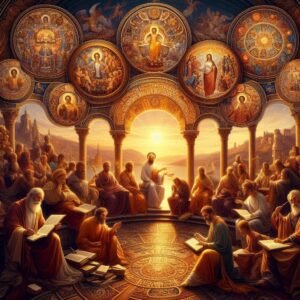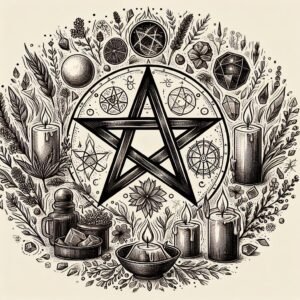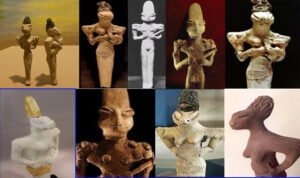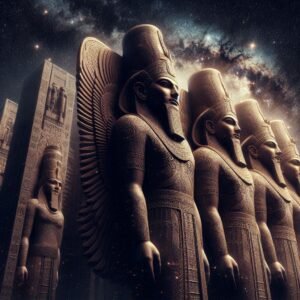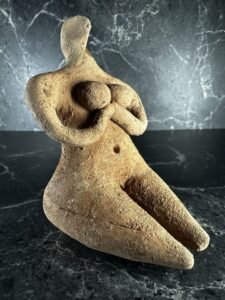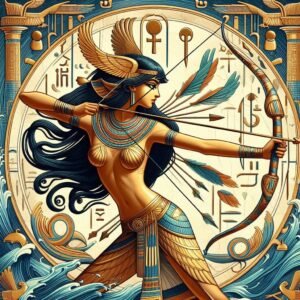
Sin, also known as Nanna or Suen, was the personification of the moon in Mesopotamian mythology. As the celestial counterpart to Shamash, Sin governed the night and was associated with fertility, cattle herding, and the tides, reflecting the moon’s importance to ancient agrarian societies. His worship was centred in Ur and Harran, and he was often depicted with a crescent moon, symbolizing his domain over the lunar cycle.
The Mesopotamian Ur was a major urban centre that dates back to the Ubaid period (c. 6500–3800 BCE) and had significant influence on the development of urbanism in the region. It is known for its ziggurat and as the birthplace of the biblical patriarch Abraham. The city played a crucial role in the history of the Near East, particularly during the early Bronze Age.
Sin’s role in the pantheon was significant, as he was considered the father of other deities such as Inanna (Ishtar) and Shamash himself, forming an astral triad with them that was central to Mesopotamian religion.
Seeing the god Sin as part of the Christian mythology
The concept of sin in Christian theology is multifaceted, often associated with moral transgressions and a separation from divine will. The God Sin, a deity from ancient Mesopotamian religion, was the god of the moon, which governs the night. This connection between Sin and the nocturnal sphere might symbolically resonate with the Christian notion of sin as a form of spiritual darkness. In Christianity, sin is perceived as a deviation from God’s path, leading to metaphorical darkness akin to the obscurity of night. This darkness can be interpreted as the absence of divine illumination, where individuals may lose sight of their moral compass and succumb to base desires such as jealousy or materialism.
The psychological interpretation of sin delves deeper into the human psyche, suggesting that sin may stem from an internal struggle with self-acceptance and love. The lack of self-acceptance can lead to a shadow self, where suppressed negative emotions and desires reside. This shadow self can manifest in behaviours that are traditionally viewed as sinful, such as greed and envy, which are forms of attachment to worldly possessions and status. The Bible points out various sins that arise from these negative attachments, indicating a moral and spiritual dissonance within the individual.
The symbolism of night in religious contexts often represents a lack of faith or spiritual ignorance, as found in the search results from Symbolism Guide and Symbolism & Metaphor. The darkness of night can be seen as a metaphor for the human condition of sin, where the absence of light reflects a state of spiritual blindness. In this sense, the night does not just signify the physical absence of light but also an existential void where moral clarity is obscured.
Other ancient deities or religions that may have influenced Christianity
The influence of Greek philosophy on early Christian thought is particularly notable, with figures such as Plato and his Theory of Forms shaping Christian views on the nature of God and reality. The Platonic ideal of a transcendent, perfect form aligns with the Christian understanding of an omnipotent, omniscient God, as well as the concept of the soul’s pursuit of divine perfection.
Moreover, the Stoic philosophy, with its emphasis on virtue, self-control, and the natural order, also resonated with Christian ethics, particularly in the development of the cardinal virtues and the notion of living in accordance with divine will. The Stoics’ belief in a rational, ordered cosmos governed by a divine logos can be seen as a precursor to the Christian Logos, the Word of God made flesh in Jesus Christ.
In addition to Greek influences, Roman religious practices and deities also left an imprint on Christianity. The Roman tradition of the divine emperor and the state religion’s emphasis on public rituals and ceremonies contributed to the shaping of Christian liturgy and the role of church leaders. The transformation of the Roman Empire under Constantine and the subsequent adoption of Christianity as the state religion led to a fusion of Roman and Christian practices, further intertwining the two traditions.
The Hellenistic Jewish tradition, which sought to harmonize Jewish religious heritage with Greek philosophy, also played a crucial role in the formation of Christian doctrine. Figures such as Philo of Alexandria, who integrated Stoic and Platonic concepts into Jewish theology, paved the way for Christian thinkers to similarly engage with and incorporate elements of Greek philosophy into their own theological frameworks.
Furthermore, the mystery religions of the Hellenistic world, with their secretive rituals, initiations, and personal salvation themes, may have influenced the development of Christian sacraments and the emphasis on personal transformation through faith. The cults of deities like Dionysus and Demeter, which promised a form of afterlife or rebirth to initiates, bear similarities to Christian promises of eternal life through belief in Jesus Christ.
The Egyptian cult of Isis, known for its widespread appeal and emphasis on personal devotion, may have influenced the Christian veneration of the Virgin Mary. The figure of Isis as a merciful, protective deity who intercedes on behalf of her worshippers echoes the role of Mary as a compassionate intercessor in Christian devotion.
Moreover, the Persian religion of Zoroastrianism, with its dualistic world-view of the eternal struggle between good and evil, may have contributed to the Christian understanding of the cosmic battle between God and Satan, heaven and hell. The Zoroastrian emphasis on the end times and the final judgment also parallels Christian eschatology.
The development of Christian concepts has been significantly influenced by a multitude of ancient deities and philosophical traditions. The synthesis of these diverse elements has resulted in a complex and nuanced religious tradition that continues to evolve and adapt to new cultural contexts. The exploration of these ancient connections enriches our understanding of the historical roots of Christian theology and its ongoing dialogue with the philosophical and religious ideas of the past.
Subscribe to our post updates - Don't miss a thing!!

